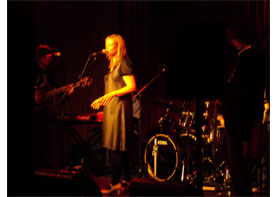A Quote by Jhumpa Lahiri
They were things for which it was impossible to prepare but which one spent a lifetime looking back at, trying to accept, interpret, comprehend. Things that should never have happened, that seemed out of place and wrong, these were what prevailed, what endured, in the end.
Related Quotes
In my family there was no small talk, only talk about serious things like global politics - trying to interpret the distant political signs, looking desperately for some hope things would change. Religion was forbidden beginning in 1968, when I was born. So my communication with them was limited to issues of everyday life, which were issues of survival.
Many things they sawe with us as mathematicall instruments, sea compasses... spring clocks that seemed to goe of themselves - and many other things we had - were so strange unto them, and so farre exceeded their capacities to comprehend the reason and meanes how they should be made and done, that they thought they were rather the workes of gods then men.
I feel very strongly that I am under the influence of things or questions which were left incomplete and unanswered by my parents and grandparents and more distant ancestors. It often seems as if there were an impersonal karma within a family which is passed on from parents to children. It has always seemed to me that I had to answer questions which fate had posed to my forefathers, and which had not yet been answered, or as if I had to complete, or perhaps continue, things which previous ages had left unfinished.
Everything mattered and nothing did, and I was tired of trying to find out how both of those things were true. I was an itch that I'd scratched so hard I was bleeding. I had set out to do the impossible, whatever the impossible might be, only to find out that it was living with myself. Suicide became an expiration date, the day after which I no longer had to try.
There were some coaches, some teammates, some sports psychology people who I could trust and rely on. They were very important to keep me focused on the right things - the things which would be beneficial to me instead of catastrophising things and worrying about things which were not in my control.
Looking back at the worst times, it always seems that they were times in which there were people who believed with absolute faith and absolute dogmatism in something. And they were so serious in this matter that they insisted that the rest of the world agree with them. And then they would do things that were directly inconsistent with their own beliefs in order to maintain that what they said was true.
I never saw my mother in jeans, even in the country. She had one pair, which I have, but she never wore them. They were from 'Rear Window,' in the end when she's wearing jeans and loafers and a shirt. They were comfortable things that zip at the back, with really tight little pleats. They're very dark, they're not proper denim.
It was a figure painting class, where you had a model, and [Robert von Neumann ] would wander around and he'd come up behind someone and say, "Well, what are you trying to do?" And if you told him what you were trying to do, he would then proceed to discuss this with you and suggest things that you might look at and ways in which you could improve what you were attempting to do, etc - never worked on your painting, never touched your painting but talked extensively about what you were trying to do.
Coming from a sort of very rigid European type of training to this culture which is just a little more open - a lot more open, and kind of curious, and asking different sorts of questions.Because the problem for me was that the European modernist movement in the '70s was all about right or wrong. Some things were right and you were dealing with the truth, as it were, and then some things were wrong and therefore not allowed.



































